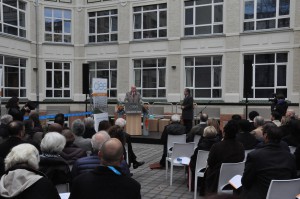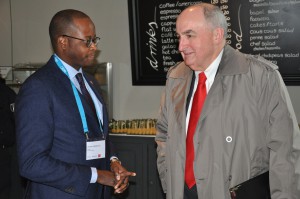Opening doors to and building a better world
While tomorrow’s formal inauguration of the new IU Europe Gateway office promises to be the signature highlight of this busy, weeklong trip to Berlin, IU had the opportunity to share the stage at another major celebration here this afternoon.
Wednesday marked the grand opening of the new Global Institute of the Council on International Educational Exchange, or CIEE, an organization with which IU has partnered for more than four decades. Together, IU and the CIEE have developed world-class educational programs in science, music, languages and culture, and more than 2,500 IU students and dozens of IU faculty and staff have benefited from participating in CIEE programs all across the globe.
The IU Europe Gateway is nestled within the Global Institute, an architecturally impressive complex located in Kreuzberg, one of Berlin’s most culturally diverse and vibrant neighborhoods. Over the last 18 months, CIEE worked to transform a 100-year-old, seven-story factory building, located at the address Gneisenaustrasse 27, or G27, into an interdisciplinary campus, featuring dormitories, classrooms and offices serving up to 200 students, that creatively blends elements of old and new Berlin.
Today, the new facility hosted visitors from around the world who were attending CIEE’s 68th annual conference, which focused on the “reinvention” of study abroad and featured the first-ever university “presidents’ workshop” on this increasingly important subject.
The workshop included presidents from a number of minority serving institutions, as well as IU President Michael A. McRobbie and Martin McCrory, IU associate vice president for diversity, equity and multicultural affairs. Also representing IU were Vice President for Diversity, Equity and Multicultural Affairs James Wimbush and Kathleen Sideli, associate vice president for overseas study and active member of the CIEE Board of Directors.
Before an audience that included leaders of some of the oldest historically black colleges and universities in U.S., McRobbie acknowledged the important role such institutions play in serving as “major gateways” to higher education for many students who are part of under-represented minority groups, are from low-income families and who are often the first in their families to attend college. He also talked broadly about IU’s longstanding commitment to diversity and equity, and the university’s concerted effort to reduce barriers that often make it difficult for low-income and minority students to study abroad. IU is approaching the point where the percentage of minority students who study abroad more closely reflects the minority composition of its campuses, but, as McRobbie noted, the university seeks to increase minority participation in study abroad beyond these recent gains.
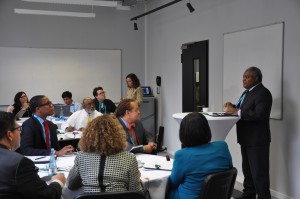
Martin McCrory, IU associate vice president for diversity, equity and multicultural affairs, speaks in Berlin at a summit meeting on increasing study abroad opportunities for minority and low-income students.
Associate Vice President McCrory told summit attendees that he wasn’t able to study abroad until he was in his 30s, but that the experience was ultimately “life changing.” He also talked passionately about his interactions with IU students who have come back from their first overseas travel, in densely populated countries such as China and India, feeling equally inspired, enlightened and culturally aware of those with whom we share the world.
McCrory wrapped up his presentation by describing some specific efforts at IU aimed at ensuring all IU students have the opportunity to study abroad—from raising funds for study abroad scholarships through the university’s new bicentennial fundraising campaign to participating in new endeavors such as the CIEE’s Passport Caravan. IU will be one of the first schools to take part in the program, which encourages students to apply for a passport early in their college career. In partnership with CIEE, IU’s Office of the Vice President for Diversity, Equity and Multicultural Affairs has committed funds to help cover the cost of passport applications for IU students.
“It may not sound like a lot,” McCrory said, “but even just a couple of weeks overseas can change the course of a student’s life.”
The power of international education
Despite the first real Berlin weather IU delegation members have experienced thus far on their trip (jokingly described by several individuals today as “50 shades of gray”), a bright, positive mood permeated the chilly air in the complex’s spacious, outdoor courtyard, where today’s ceremony for the new CIEE Global Institute was held.
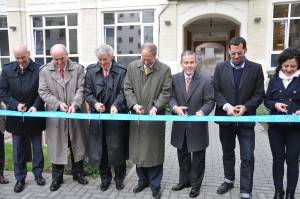
IU President McRobbie, second on left, joins U.S. Ambassador to Germany John Emerson in a ribbon-cutting ceremony for the new CIEE Global Institute.
The head of one of the CIEE’s most “special” partners, as he was introduced by CIEE President and CEO James Pellow, President McRobbie served as one of the main speakers at the grand opening. After congratulating the CIEE on its new global home in Berlin, McRobbie talked about the “power of international education” and the guiding principles for both IU and the CIEE as they seek to provide students with meaningful study abroad experiences.
“Higher education must embrace diversity in the broadest sense,” he said. “For through interaction with others who hold views and perspectives that differ from our own—whose life experiences and customs are vastly different from ours—our minds are opened to new ways of understanding. We comprehend, we empathize, we learn.
“This superb new Global Institute represents the commitment that all of us share to delivering quality educational programs that meet the needs of the 21st century,” McRobbie added. “It represents our shared long-term commitment to international exchange, to the promotion of international understanding and to opening wider the gates of opportunity to students from all backgrounds.”
On a brisk afternoon, McRobbie served to warm up the crowd for the event’s keynote speaker, U.S. Ambassador to Germany John Emerson, with whom the IU delegation expects to meet tomorrow afternoon.
Emerson, who has served in his post for more than two years, amplified what others, including McRobbie, had said before him about the vital importance of study abroad in creating a more globally literate, culturally understanding society. He also eloquently characterized a city in which IU expects to build upon its historic connections and be increasingly engaged.
“No city represents reinvention like Berlin,” Emerson said. “It’s been said that the history of our time has been written in the life of Berlin.”
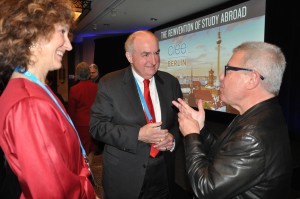
President and First Lady Laurie McRobbie meet with renowned Polish-American architect and artist Daniel Liebeskind.
Finally, several hours after McRobbie, Ambassador Emerson and others took part in the ceremonial ribbon-cutting for the new Global Institute, McRobbie and his fellow IU delegation members had front-row seats for the opening address of the annual CIEE conference, presented by celebrated Polish-American architect and artist Daniel Libeskind. In an inspiring and frequently humorous hour-long talk, Libeskind discussed the design process behind several of his most famous structures, including, among others, the Jewish Museum here in Berlin, the Military History Museum in Dresden, Germany, and the new World Trade Center complex, still under construction in the lower Manhattan section of New York City. He also shared a number of stories and insights into why he, as the son of Holocaust survivors and someone who immigrated to the U.S. as a teenager, believes so strongly in the value of enhancing our global literacy and cultural understanding.
In one of the funnier moments of his talk, Libeskind recalled having to defend his design for the Jewish Museum to a German government official who had assumed his post after the fall of the Berlin Wall in 1989 and only a year after Libeskind had won an anonymous competition for the new museum’s design. At that point, Libeskind was a relative unknown, with no major projects to his name.
As Libeskind recalled the story, the government official pointedly asked the aspiring architect, then in his early 40s and struggling to launch his career, what successful projects he’d designed in the past. Libeskind was quick to craft the perfect rejoinder. “If Germany wants to continue to focus on the past,” he calmly told his interviewer, “it will never have a future.”
Indeed, Libeskind’s talk—a fitting close to a full day of memorable activities in Berlin—offered many reminders of the importance of looking forward, while still honoring the past, in an increasingly interconnected world.
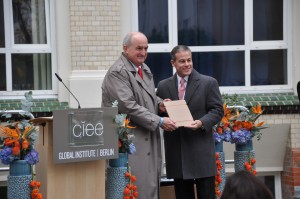
President McRobbie receives a cardboard etching of the new Global Institute from CIEE President and CEO James Pellow.
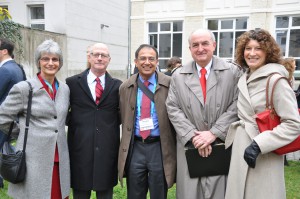
President McRobbie and members of the IU delegation meet up with an old friend at the Global Institute grand opening, former dean of the College of Arts and Sciences at IU Bloomington Kumble Subbaswamy, pictured at center.
Tags: Berlin, CIEE, Council on International Educational Exchange, Daniel Libeskind, Equity an Multicultural Affairs, Germany, Global Institute, IU Bicentennial Strategic Plan, IU Europe Gateway, IU Global Gateway Network, James Pellow, James Wimbush, John Emerson, Kathleen Sideli, Kreuzberg, Martin McCrory, Michael McRobbie, Office of the Vice President for Diversity, OVPDEMA, Passport Caravan, U.S. Ambassador to Germany



